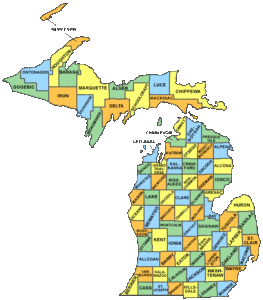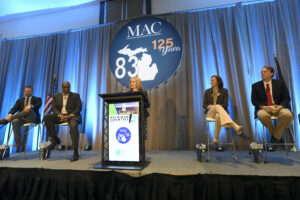Deal reached, adopted to avoid federal debt default

“After several rounds of negotiations, the White House and House Republican Leadership reached an agreement to address the debt limit and cap spending,” the National Association of Counties (NACo) reported. “The deal, titled the Fiscal Responsibility Act of 2023 (FRA) (H.R. 3746), would suspend the debt ceiling through January 1, 2025, effectively increasing the amount of money that the federal government can borrow to fund federal programs. On January 19, 2022, the U.S. Department of the Treasury announced that the federal government had hit its $34.1 trillion debt limit. This agreement comes less than a week ahead of the deadline after which the federal government would no longer have the capacity to pay its obligations.
“After quickly passing the House, the legislation passed the Senate by a vote of 63-36 on June 1, ensuring the federal government will not run out of money to pay its bills on Monday, June 5, the day the government would default on its debt.
“The nonpartisan Congressional Budget Office (CBO) released its assessment of the bill’s impact on federal debt and deficits. CBO estimated that if the legislation were enacted, budget deficits would be reduced by about $1.5 trillion over the next decade and interest on the public debt would be reduced by an estimated $188 billion.
“NACo applauds our federal partners for reaching a bipartisan agreement to raise the federal debt ceiling. While this is a significant move that will provide much-needed certainty to counties, there are a handful of provisions of relevance to local leaders including spending cuts, permitting reform, implementing new work requirements for certain federal public assistance programs and reinstating federal student loan payments.
“A comprehensive analysis of the Fiscal Responsibility Act and its impact on county governments can be found here.”
Podcast 83 takes look at much-needed juvenile justice package
 In a special episode of Podcast 83, MAC Governmental Affairs Associate Samantha Gibson provides a detailed overview of a 20-bill package to reform Michigan’s juvenile justice system.
In a special episode of Podcast 83, MAC Governmental Affairs Associate Samantha Gibson provides a detailed overview of a 20-bill package to reform Michigan’s juvenile justice system.
Juvenile justice reform has long been a priority for MAC and the issue gained momentum with the release of recommendations from a state task force formed in 2021. The new legislative package is largely built on the task force’s ideas and is strongly supported by MAC.
Increasing the Child Care Fund reimbursement rate for counties to 75 percent, from the current 50 percent, is the no. 1 priority for MAC in this package, Gibson explained.
Also, the package will reform juvenile justice services by using mental health and risk screening tools to benefit youth in the system and allow counties to better serve court-involved youth. The best practices that would be implemented within this policy, Gibson said, will allow for rehabilitation and reintroduction into society, as well as lead to reduced recidivism rates for court-involved youth.
View the full video of the episode, recorded on May 23, by clicking here.
For links to all the bill texts in the package, see MAC’s May 26, 2023, Legislative Update.
Previous episodes can be seen at MAC’s YouTube Channel.
And you always can find details about Podcast 83 on the MAC website.
New state council to study population issue
 A new state body will analyze the factors affecting Michigan’s population and what steps can be taken to spur growth, Gov. Gretchen Whitmer announced at a Mackinac Island event this week.
A new state body will analyze the factors affecting Michigan’s population and what steps can be taken to spur growth, Gov. Gretchen Whitmer announced at a Mackinac Island event this week.
Via Executive Order, Whitmer is forming the “Growing Michigan Together Council,” which will have 21 voting members and seven non-voting members.
The council is charged with four tasks:
- “Identify concrete, data-driven and evidence-based goals to grow the state’s population, improve educational outcomes from preschool through postsecondary education, attract and retain talent and build long-term, sustainable infrastructure that meets the needs of the population;
- “Define the gap between Michigan and the best-performing states on the goals identified by the council;
- “Identify specific short-term, medium-term and long-term policies needed to close these gaps and meet the goals identified by the council; and
- “Analyze the effectiveness of existing programs and spending dedicated to achieving the goals identified by the council and make recommendations on how to address any gaps between projected revenues and recommended expenditures.”
MAC will be monitoring appointments to the council and its work and will report to membership as needed.
For more information on this issue, contact Deena Bosworth at bosworth@micounties.org.
Land tax proposal highlighted at Mackinac Policy Conference
 Detroit Mayor Mike Duggan is calling on the Legislature to enact a land value tax system to tackle the obstacles cities face in revitalization efforts. Duggan made a presentation at this week’s Mackinac Policy Conference on Mackinac Island.
Detroit Mayor Mike Duggan is calling on the Legislature to enact a land value tax system to tackle the obstacles cities face in revitalization efforts. Duggan made a presentation at this week’s Mackinac Policy Conference on Mackinac Island.
Although MAC does not have legislative language to review at this time, the idea is to increase taxes paid on vacant land and blighted properties and decrease the tax on occupied residential buildings. The intent is to offset the revenue and prevent absent property owners from sitting on property that could otherwise be developed or repurposed.
MAC will watch this proposal closely and work within our committee process to evaluate it.
For more information on this issue, contact Deena Bosworth at bosworth@micounties.org.
Check out videos from 2023 Legislative Conference

MAC’s Deena Bosworth leads the legislative leadership panel at the 2023 Legislative Conference on April 26.
For those unable to attend the recent 2023 Legislative Conference, or if your notes taken are not as comprehensive as you wish, MAC has created a series of videos of state leaders speaking on key issues during the conference. All the links below will take you to MAC’s YouTube channel, where you also can find videos of our Podcast 83.
- State Budget Director Chris Harkins on revenue sharing and court funding during his presentation on April 25, 2023.
- Harkins on infrastructure spending on April 25.
- House Speaker Joe Tate (D-Wayne) on juvenile justice reform during a legislative leadership panel on April 26.
- Senate Majority Leader Winne Brinks (D-Kent) on working with counties during a leadership panel on April 26.
- Senate Minority Leader Aric Nesbitt (R-Van Buren) on juvenile justice reform during a legislative leadership panel on April 26.
- House Minority Floor Leader Bryan Posthumus (R-Kent) on natural resources conservation during a legislative leadership panel on April 26.
For all the presentations from the three-day conference, visit MAC’s website.
June 8 fiscal webinar to focus on internal controls
 The Michigan Department of Treasury and Michigan State University Extension (MSU Extension) are hosting the next “Fiscally Ready” webinar on June 8, from 10 a.m. to 11:30 a.m. ET. This FREE training is designed to assist both appointed and elected officials.
The Michigan Department of Treasury and Michigan State University Extension (MSU Extension) are hosting the next “Fiscally Ready” webinar on June 8, from 10 a.m. to 11:30 a.m. ET. This FREE training is designed to assist both appointed and elected officials.
Managing Internal Controls – Register Now
This training will include a deep dive into internal controls. It will cover what internal controls are, why you need them, how they help your community, how to implement them, and where to start.
What will be covered:
- Building a culture of fiscal sustainability
- The role of internal controls in fiscal sustainability
- Understanding internal controls and their importance
- How internal controls help strengthen your community
- Best practices for internal controls implementation
For more information about Fiscally Ready Communities, please check out the Treasury Fiscally Ready Communities webpage. This webpage includes Treasury’s 32-page Fiscally Ready Communities Best Practices document, which we encourage all local officials to review.
If you have any questions, please email TreasLocalGov@michigan.gov with the subject line “Fiscally Ready.”
Five Michigan counties receive NACo awards
 The work of five Michigan counties was honored recently by the National Association of Counties (NACo) via its 2023 Achievement Awards.
The work of five Michigan counties was honored recently by the National Association of Counties (NACo) via its 2023 Achievement Awards.
The Achievement Awards Program is a non-competitive awards program which seeks to recognize innovative county government programs.
Oakland, Macomb, Washtenaw, Midland and Wayne were honored in at least one of 18 different categories in the award program. Macomb alone was cited a whopping 10 times across the categories, with Oakland claiming 5 citations, Wayne 3 and Midland and Washtenaw 1 each.
Midland was honored for its Communities of Excellence program, which “is designed to bring together businesses, nonprofits and government agencies to work collaboratively towards common goals, using the Baldrige Performance Excellence Program’s framework for organizational excellence. … It provides participating organizations with training, resources and support to help them achieve their goals and become recognized as models of excellence.”
 Staff picks
Staff picks
- State issues $1.5 million in grants to county fairs (Michigan Department of Agriculture and Rural Development)
- Some Michigan businesses are buying housing to secure their workforce (MLive)
- Stateside Podcast: ‘Up North’ has a housing problem (Michigan Radio)
- Barry, Wayne counties among brownfield grant recipients (U.S. Environmental Protection Agency)
